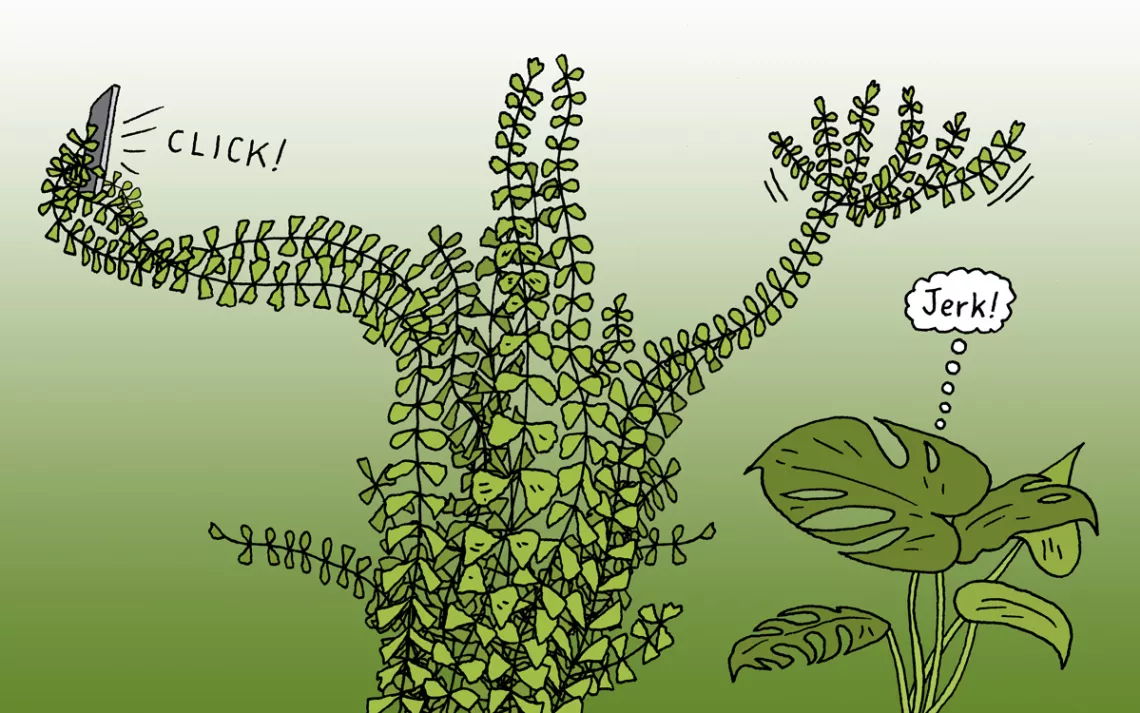ICYMI: Selfie-Taking Fern & Tool-Using Pigs
A weekly news roundup for busy people

Illustration by Peter Arkle
A maidenhair fern at the London Zoo by the name of “Pete” is declared the taker of the first plant selfie.
Typhoon Hagibis, which shut down Tokyo and killed at least 77 people, is the newest example of how climate change is moving the point where typhoons reach maximum intensity farther and farther north.
Algal blooms around the world are getting more severe.
Donald Trump’s acting White House chief of staff announces that the climate crisis will not be on the agenda at the G7 summit next year, and that the entire summit will be held at a Trump-owned resort in Florida.
The Trump administration moves to exempt Alaska's Tongass National Forest from Clinton-era rules around logging and road-building, opening the door to the logging of 165,000 acres of old-growth forest.
Shell and ExxonMobil plan to increase oil production by 35 percent by 2030—almost the opposite of the 45 percent reduction in carbon emissions that is necessary by 2030 to stave off the most catastrophic effects of climate change. “We have no choice,” says the Shell CEO.
London police ban protests by the climate action group Extinction Rebellion from the entire city. The protests continue.
Pigs are recorded using tools for the first time.
Facing temperatures of 110+ degrees F (in the shade), Qatar is now air conditioning the outdoors.
Unless carbon emissions decline, over half the world’s population faces likely food and water shortages by 2050.
A giant battery sprouts in Queens.
Gas pumps are disappearing in Norway as electric cars take over.
Electricity from British wind farms, solar panels, and renewable biomass plants surpass fossil fuels for the first time since the UK’s first power plant fired up in 1882.
Formosa Plastics Corp. agrees to stop dumping plastic nurdles into Texas waterways and pay $50 million for environmental remediation.
NASA’s first all-women spacewalk is finally happening, because the International Space Station finally has two functioning woman-size spacesuits.
The Paris Zoological Park claims to be the first zoo to exhibit a slime mold. Dubbed the “blob,” it looks like a fungus, acts like an animal, and has “almost” 720 sexes.
California bans smoking on all state beaches and state parks.
Ivory Coast and Ghana threaten to eliminate “ethical sourcing” programs with companies like Hershey, on the grounds that even under the program, West African cocoa farmers aren’t making enough money to survive.
California forbids hotels from giving visitors tiny plastic shampoo bottles.
Americans who take more than six round-trip flights a year are responsible for two-thirds of the emissions created by airplanes.
The Yakama and Lummi Nations call for the removal of three hydroelectric dams on the lower Columbia River to save dwindling populations of salmon and orcas.
Scientists at the Oregon Institute of Technology are pumping oxygen into Upper Klamath Lake in an attempt to save local fish from hypoxia.
Antibiotic resistance is spreading among marine mammals, possibly due to nearby fish farms.
Humpback whales in Alaska use their pectoral fins to herd shoals of fish directly into their mouths.
A month after receiving a report from the US Navy that Tetra Tech might be falsifying data on a hazardous waste cleanup project in San Francisco, the EPA awarded Tetra Tech’s parent company an $85 million contract involving 30 former uranium mines on Navajo land.
Golfrid Siregar, who helped Indonesian communities threatened by dams and oil palm plantations take the companies behind those developments to court, dies under suspicious circumstances.
Scientists discover that hurricanes sometimes cause earthquakes on the ocean floor, go ahead and dub them "stormquakes."
WeWork closes over 2,000 phone booths at its office-sharing sites after it discovers they have been off-gassing high levels of formaldehyde.
Access to the outdoors is more effective than drugs in treating some side effects of dementia.
Fifty-five endangered eastern barred bandicoots are released onto French Island, off the coast of Victoria, in an attempt to provide the species with new habitat that hasn’t been taken over by cats or foxes.
It only took two plague strains to wipe out 30 percent of Europe’s population.
The sand dunes of the Sahara are home to the fastest ants in the world.
Scientists say fossilized trilobites found in Morocco suggest the practice of standing in line may date back 480 million years.
Even tiny galaxies are home to giant black holes.
 The Magazine of The Sierra Club
The Magazine of The Sierra Club



